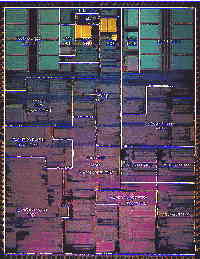Apple's PA Semi buyout: A defensive move?


I ran this by former Microprocessor Report analyst Peter Glaskowsky the other day. In his CNET blog on Friday, he offered a great run down of the questions surrounding Apple's investment.
He writes that there doesn't seem to be a need for Apple to buy either the technology or the engineering talent. Apple is getting its chips elsewhere and that's a good thing.
PA Semi's people are designers of high-complexity, medium-power microprocessors with unusual custom I/O interfaces. These skills are even less useful to Apple, at least for its current product line. ...
Apple just doesn't need PowerPC chips. It moved the Mac line away from PowerPC. Intel is doing a reasonably good job of providing both low-power and high-performance x86 chips. PowerPC chips — especially those like PA Semi's — aren't a good fit in cellphones like the iPhone.
Glaskowsky told me that PA Semi's one product so far wouldn't fit into any of Apple's existing product lines.
He said that PA Semi had already announced the end of life for its current part, so that it wouldn't be used anywhere. And it's much slower at integer and floating-point processing than Intel's Core 2 Duo, although it has a better I/O subsystem.
"As for some hypothetical different kind of processor from PA Semi — and I'm pretty sure there isn't one, since they haven't had the time or people to do a second design — there's still no need for Apple to design its own processors. There are lots of good processors out there."
"It's possible PA Semi has quietly changed direction, but that still wouldn't explain Apple's purchase," he told me.
On the other hand, there could be some unknown legal issue between the companies. More from Glaskowsky's blog post:
And that leaves us with litigation protection. Apple knows just what's at stake here. Apple invested in a previous PowerPC design firm, Exponential Technologies, and after Exponential went under, it slapped Apple with a lawsuit alleging that Apple deliberately sabotaged its efforts to sell chips to both Apple and Mac clone makers.
Could PA Semi possibly have a basis for a complaint against Apple? To me, this is nigh-impossible. How could Apple have made the same mistake with the Exponential situation so fresh in its institutional memory? The most generous thing I can say about this theory is that it isn't impossible.
Now, I remember the Exponential story, as well, and covered the company for MacWEEK back in the days. The company made a chip that was called the PPC X704. It was formally announced at the Microprocessor Forum in October, 1996.
I recall seeing it demonstrated at a launch party at some hotel (why do I remember walking by a swimming pool?). In suites, Exponential and software application partners ran high-end content creation applications on unmodified Power Mac 9500s to show the chip's compatibility.
The company said it could produce as many as 300K units in 1997. At the event, clone makers said they were interested in the chip. Here's a bit from my story in the 10.21.96 issue of MacWEEK.
"It's a mainstream solution, not a fringe solution," said Peter Mehring, vice president and general manager at UMAX Computer Corp. of Fremont, Calif. The clone company plans to ship an X704 model next spring.
"It's for real," said Bill Goins, director of product marketing for Power Computing Corp. of Round Rock, Texas, which plans to release a model in April. Goins said he also expects Exponential to keep up the pace. "This is only the first go-round. They could get two times the frequency in another year."
However, the X704's BiCMOS technology was difficult to cool. X704 systems would require plastic ductwork and an additional fan that would focus air on the chip's heat sink.
At the party, I remember Richard Bergman, Exponential's VP of marketing, say that the company (and its technology) was "going to save Apple."
Big talk.
However, when Apple looked at the X704 and compared its performance with less-expensive chips in the pipe from IBM and Motorola, there was a problem. A lower-power version of the PPC 604e with the code name "Mach 5" had 90 percent of the performance of the X704, Apple executives said in the late winter of 1997.
And in the wings was "Arthur," the PowerPC G3. Unlike the X704 and the 604e, the G3 didn't support multiprocessing, something that customers for high-performance machines wanted.
At the same time, Apple dragged its feet on support for clone machines — where the X704 would be found. And Apple was slow to support the X704 in the Mac ROM, saying it would delay that support into the fall.
Of course, by the end of that summer, Apple told the community that its licensing experiment was over.
But Exponential had already called it quits in May, 1997. The writing was on the wall for Mac licensing and the company couldn't secure another round of funding.
Bring on the lawyers! It worked then and maybe, Apple is making sure that it won't happen again. It must be less painful and expensive to buy the company before the trial lawyers get involved than after.